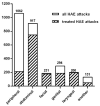Clinical Characteristics and Management of Angioedema Attacks in Polish Adult Patients with Hereditary Angioedema Due to C1-Inhibitor Deficiency
- PMID: 34884311
- PMCID: PMC8658320
- DOI: 10.3390/jcm10235609
Clinical Characteristics and Management of Angioedema Attacks in Polish Adult Patients with Hereditary Angioedema Due to C1-Inhibitor Deficiency
Abstract
Hereditary angioedema (HAE) due to C1-inhibitor (C1-INH) deficiency is a rare disease characterized by recurrent swellings. This study aims to determine (i) the clinical characteristics of the HAE patient population from Poland, and (ii) real-life patients' treatment practices. A cross-sectional study involved 138 adult HAE patients (88 females, 50 males) treated in six regional HAE centers in Poland. Consecutive patients during routine follow-up visits underwent a structured medical interview on the clinical characteristics of the course and treatment of HAE attacks within the last six months. A total of 118 of 138 patients was symptomatic. They reported in total 2835 HAE attacks predominantly peripheral and abdominal, treated with plasma-derived C1-INH (61.4%), icatibant (36.7%) and recombinant C1-INH (1.9%). An amount of 116 patients carried the rescue medication with them while traveling, and 74 patients self-administrated on demand treatment. There were twice as many symptomatic women (n = 78) as there were men (n = 40). Women treated their HAE attacks significantly more often than men. Older patients (≥65 years) reported a longer delay in diagnosis, and practiced the self-administration of rescue medication less frequently in comparison to other patients. Clinical features of the surveyed population are similar to other European, but not Asian, HAE patient groups. Self-administration still remains an unmet medical need. Some distinct HAE patients may require special attention due to the severe course of the disease (females) or a delay in diagnosis (the elderly).
Keywords: C1-inhibitor deficiency; bradykinin-mediated angioedema; emergency; hereditary angioedema; treatment.
Conflict of interest statement
K.P.-W. received a travel grant from CSL Behring; M.B. received a travel grant from CSL Behring; A.J. has served as a speaker for CSL Behring and Takeda; J.J.-B. has served as a consultant for CSL Behring and Takeda; J.G. has served as a speaker for CSL Behring and an a speaker and an advisor for Takeda; K.K. has served as a consultant for CSL Behring and Takeda; R.P. received speaking fees and educational/scientific grants from Takeda/Shire and CSL Behring; G.P. is or recently was a speaker and/or advisor for CSL Behring, Takeda, Pharming, and has served as an investigator for clinical trials sponsored by BioCryst Pharmaceuticals.
Figures
References
-
- Steiner U.C., Weber-Chrysochoou C., Helbling A., Scherer K., Schmid Grendelmeier P., Wuillemin W.A. Hereditary angioedema due to C1–inhibitor deficiency in Switzerland: Clinical characteristics and therapeutic modalities within a cohort study. Orphanet. J. Rare Dis. 2016;11:43–50. doi: 10.1186/s13023-016-0423-1. - DOI - PMC - PubMed
Grants and funding
LinkOut - more resources
Full Text Sources



